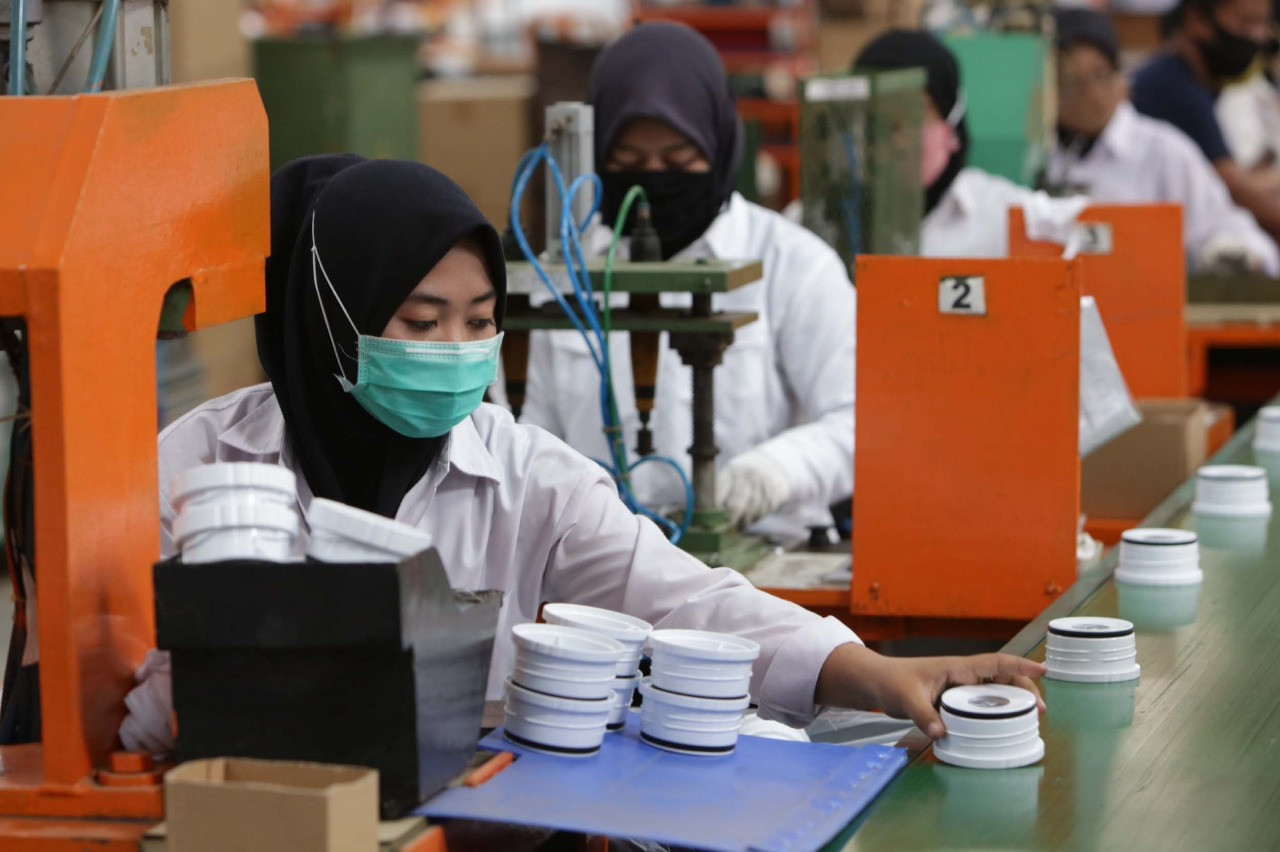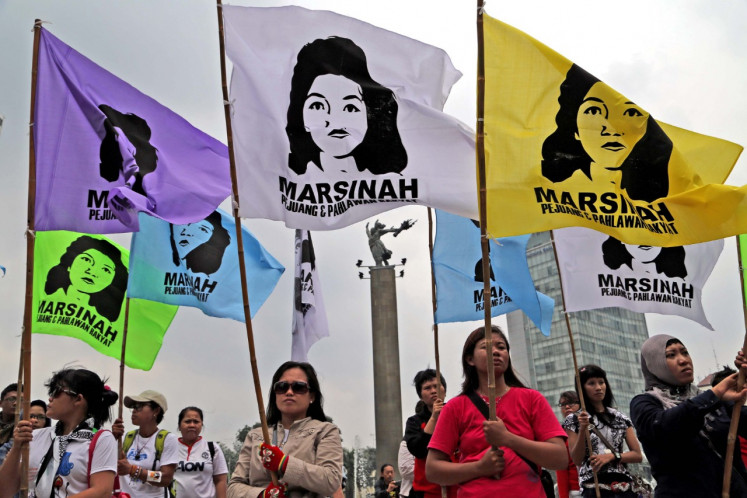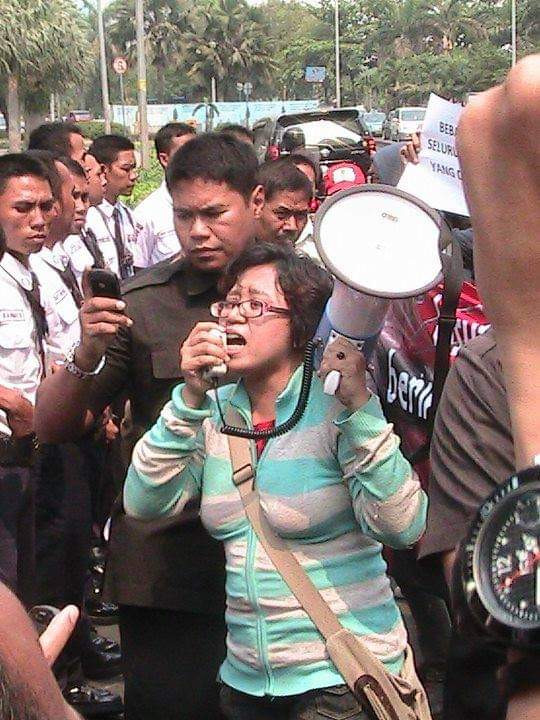Popular Reads
Top Results
Can't find what you're looking for?
View all search resultsPopular Reads
Top Results
Can't find what you're looking for?
View all search resultsGo with the flow: Indonesian women divided over menstrual leave
Indonesia clearly provides menstrual leave for women but in reality, each company implements this rule differently.
Change text size
Gift Premium Articles
to Anyone
L
ike many Indonesians, Maria Qibti, 32, was unaware of the existence of Article 81 of Law No. 13/2003 on labor, which allows women to take two days of paid leave when they are menstruating.
In 2013, Maria, a junior reporter at the time, arrived at her office in Jakarta despite suffering intense menstrual pain. She could barely work. Her boss, a woman, eventually noticed her discomfort and later chastised her for not taking menstrual leave.
“She told me about a coworker who needed an IV [intravenous] drip every month on the first day of her period. My boss basically showed me tough love for not knowing my rights.”
Months later, Maria was assigned to another department and her new supervisor was, again, a woman. One day, she experienced severe menstrual cramps and could not leave her bed. The pain was so intense that she had to use a cold compress and also broke out in cold sweats.
Based on her experience with her previous supervisor, she sent a text message to her new boss about taking menstrual leave. She never received a reply.
“I thought [the leave day] was a given because my [new] boss was also a woman, a feminist, and was pregnant at the time; surely she would understand,” said Maria.
Later, however, Maria found out through a friend that the boss in question had posted a comment about period leave on her social media account that same day, saying that the rule should be revoked because she believed it was an excuse for laziness.
Whether the boss was referring to her or not, Maria conceded she was “heartbroken” when she read the post.
Maria’s experience with her second boss was echoed by Hera, 33, a civil servant who once worked in a government agency in Bogor, West Java. Preferring to use only her first name, Hera said had come to a point where she would just ignore her rights to take menstrual leave.
While acknowledging that Indonesia’s law on period leave was “amazing progress”, she also conceded that her place of work had no understanding of the specific rights of female workers, such as menstrual leave, maternity leave and the right to breastfeed at work.
“I mean, let’s put aside menstrual leave for a moment,” she said. “In 2020, I was seven months pregnant and needed to take maternity leave. My [male] boss responded by asking me if I could postpone it.”
Hera recalled that her jaw dropped and asked her boss if he would ask his wife, who had given birth twice, the same question. He merely grinned at her, she said.
The boss finally relented when Hera experienced early contractions and bed rest was ordered by her doctor. Even during bed rest, Hera could not fully focus on her childbirth because she had to train her temporary replacement via phone calls and texts.
After that experience, Hera conceded that whenever she experienced intense period pains, she would see a doctor and take sick leave with a doctor’s note.
“I’m tired of explaining, tired of fighting to get my rights, especially [when I’m] in pain. The doctor's note is my shortcut, [but it’s] not the best practice I would suggest,” she said.
Separately, Lestari, 38, who asked to be identified by her first name, tried hard to prove her worth in front of her male coworkers — to the point of ignoring her needs as a woman.
“I just don’t want to be seen as if I’m making excuses. So, even if I have a fever during my period, I’ll still go to the office,” said Lestari, who works in Jakarta.
"I'm not willing to use my period pain as an excuse to rest. I worry that people will think, 'Wow, it's so convenient to be a woman because they can take a two-day vacation whenever they have their period'. I've heard that before from a coworker and it scares me."
She blames a male-centric culture for making women feel the societal pressure to ignore their rights, even as her male bosses are more sympathetic toward women who are on their period.
“One time, my seniors reprimanded me for pushing myself too hard [while on my period]. They told me to take the day off and just go home,” she said.
Rita, 37, shared a similar positive experience in 2012 when she was told by her doctor that she had an ovarian cyst as well as endometrial hyperplasia, or the thickening of the uterine wall. She experienced bleeding several times.
“My bosses and coworkers never once asked me when I was able to go back to work when I was on my period. [That was] good for my mental health,” she said.
Different views
Hani, 39, who works as a human resource manager for PT Heavenly Nutrition Indonesia in Jakarta, said she always complied with the menstrual leave policy in accordance with the law.
However, she does not agree with the rule. Indeed, she would prefer it to be removed entirely because it was “too feminist”.
“Menstrual leave does not encourage gender equality and female leadership. It is better to use sick leave and not use menstruation as an excuse,” she said, adding that menstrual leave could be abused and not all women experienced pain during their period.
Hani also suggested that a lot of women who worked as factory workers used menstrual leave because they often asked for a day off.
Dian Septi Trisnanti, 37, the chairperson of the Federation of United Indonesian Trade Union (FSBPI), disagreed, arguing that women became factory workers as a result of capitalism and the patriarchy.
“They work long hours at the factories in addition to doing domestic work and giving birth, basically producing even more [future] workers. So, perhaps we should think twice and reflect before calling them lazy,” she added.
Dian Septi Trisnanti, in the middle, chairperson of the Indonesia’s Federation of Labor Unions, says women who become factory workers were the results of capitalism and patriarchy. (Dian Septi Trisnanti/Courtesy of Dian Septi Trisnanti)Dian reiterated that Indonesia had come a long way in passing Article 81 of Law No. 13/2003 on labor. She pointed to Marsinah, an independent trade unionist employed by a watch factory in East Java who was kidnapped in 1993, allegedly by the New Order military, after serving as a negotiator for women's rights, including menstrual leave, during a workers' strike. She was found dead four days later.
Mitra Kadarsih, 38, who holds a master’s degree in midwifery from the Padjajaran University in Bandung, West Java, said every woman experienced menstruation differently and unfortunately, they had no say in the matter.
“If we erase menstrual leave and replace it with sick leave, this will harm women who experience dysmenorrhea [painful periods or menstrual cramps]. They will likely use up all of their sick leaves. What if they experience other illnesses?” she said.
Mitra added that the law had taken research into account, including the fact that menstrual cramps usually receded within eight to 72 hours and, therefore, the right to take menstrual leave was fair.
“There’s no need for a doctor’s notes because the law itself is already based on scientific research,” she said.
She added that any woman who experiences menstrual cramps for more than two days should take additional sick leave with a doctor’s note.
“Each woman can assess herself and each experience is valid,” she said.













